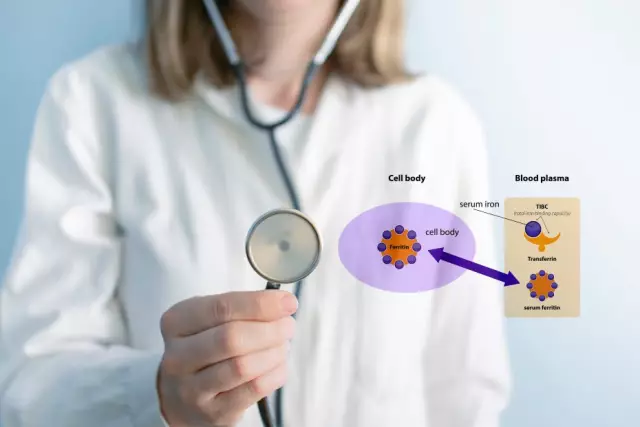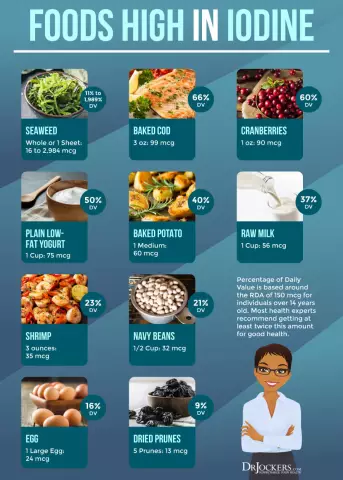- Author Rachel Wainwright wainwright@abchealthonline.com.
- Public 2023-12-15 07:39.
- Last modified 2025-11-02 20:14.
Excess iron
Excess iron is a very serious and common problem caused by too much iron in the body.

Iron is one of the most abundant chemical elements in nature and, naturally, an essential trace element for the human body. The human body contains approximately 3.5 to 4.5 grams of iron. 2/3 are in the blood, 1/3 - in the liver, bone marrow, muscles and spleen.
Iron has many functions in our body:
- supports the functioning of the immune system;
- participates in the transport of oxygen throughout the body;
- neutralizes toxic substances entering the body;
- participates in the formation of enzymes and red blood cells;
- supports the synthesis of thyroid hormones;
- important for the good condition of skin, nails and hair;
- participates in the regeneration processes in the body.
For iron to be absorbed, a good secretion of gastric juice is necessary. Also, amino acids (lysine and histidine), simple carbohydrates (sorbitol, fructose, lactose), organic acids and vitamin C promote the absorption of iron. Milk and dairy products, calcium, soy protein, fiber from bran, phytin and some components of coffee and tea.
Excess iron in the body is extremely dangerous! Iron accumulates most often in the heart muscle, pancreas and liver, and this adversely affects these organs. If the excess iron is left untreated, diseases such as:
- cancer of poisoned organs;
- severe diseases of the cardiovascular system;
- diseases of the nervous system;
- arthritis and other joint diseases;
- diabetes;
- cirrhosis of the liver, hepatitis.
Causes of excess iron in the body
Factors that lead to excess iron in the body:
- Iron content in drinking water;
- Oxygen starvation caused by large amounts of exhaust fumes in cities. In the body, the lack of oxygen is compensated by an increase in the production of hemoglobin;
- Taking in large quantities or for a long time of iron preparations;
- Alcoholism;
- Passing multiple blood transfusions;
- The presence in the body of a gene that causes the body to accumulate iron (it is also called the "gene of the Celts", since it is mainly observed in the inhabitants of Scandinavia). It is present in 15% of people, but the majority is dormant.
The daily intake of iron is very approximate. The assimilation of this trace element largely depends on the state of the body, to determine which it is necessary to do blood tests. The approximate daily intake of iron for women is 18 mg, for men - 10 mg. The highest is the daily intake of iron in pregnant women in the second half of pregnancy - 33 mg.
Symptoms of excess iron

Symptoms of excess iron:
- staining in a yellow tint of the skin, tongue, palate and sclera;
- enlargement of the liver in size;
- itching;
- heart rhythm disturbances;
- weak general condition;
- thinness;
- pallor;
- pigmentation on the palms and places of old scars, in the armpits.
Excess iron in the body also makes it harder for Alzheimer's and Parkinson's. Even if there are symptoms of excess iron, an accurate diagnosis can be made only after a biochemical blood test.
Treating excess iron
The most common but most effective method of regulating iron levels in the body is through proper nutrition. It is important to remember that there is a lot of iron (more than 1 mg per 100 g) in watermelons, cranberries, melon, Brussels sprouts, bell peppers, radishes, radishes, beets, tomatoes, Jerusalem artichoke, spinach (up to 3 mg) and sorrel (up to 2 mg). The rest of the vegetables contain from 0.4 to 0.9 mg of this trace element.
Those with an excess of iron in the body need a special approach. You need to be careful even in the smallest things. For example, even ordinary ascorbic acid should not be consumed, as it can increase the absorption of iron in the body.
Bloodletting (phlebotomy) and donation are also used to treat excess iron.
YouTube video related to the article:
The information is generalized and provided for informational purposes only. At the first sign of illness, see your doctor. Self-medication is hazardous to health!






